A certain Elizabeth Crane writes:
I believe we spoke
of making mashed potatoes
on Segundo’s podcast.
A certain Elizabeth Crane writes:
I believe we spoke
of making mashed potatoes
on Segundo’s podcast.
Pink India Ink: “All over the page, words were disappearing. Entire blocks of text were being replaced, one by one, with bare, unprinted paper, winking out of existence as soon as I looked at them. Also, my head was burning. Also, I was starting to sweat profusely. A wave of nauseau hit me, I closed the book, I noted in a casual sort of way that I could no longer feel my fingers, I realized simultaneously that I could no longer see anything at all, and then…” (via Bookdwarf)
For those who advocate Spandau Ballet, I am looking for hard evidence as to why they should reunite and what they will offer the world with this latter day resurrection.
Should you have any theories, the comments are yours.
My review of Jonathan Lethem’s You Don’t Love Me Yet appears in this morning’s Philly Inquirer. Frank Wilson was even kind enough to let me sneak in a They Live reference.
Here’s a question: Why is Paul Alexander’s notorious hit piece on Mark Helprin, which appeared in the April 21, 1991 issue of New York Times Magazine under the title “Big Books, Tall Tales,” unavailable online? Not even as a paid reading option? Has Paul Alexander single-handedly managed to purge all known forms of his article? Or does he not wish to remain accountable for his own gossip-mongering?
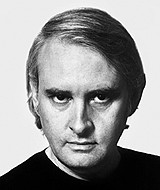 For those who don’t know the history, Paul Alexander called into question many of Helprin’s answers about his own life, smearing Helprin for being a Reaganite and an opportunist, and finding fault within Helprin’s myth-making. What any of this ever had to do with Helprin’s achievements as a fiction writer remains a mystery.
For those who don’t know the history, Paul Alexander called into question many of Helprin’s answers about his own life, smearing Helprin for being a Reaganite and an opportunist, and finding fault within Helprin’s myth-making. What any of this ever had to do with Helprin’s achievements as a fiction writer remains a mystery.
Of course, Alexander’s books remain available for any who wish to observe his Kitty Kellyesque approach to biography. Alexander called publishers “a whole industry of cowards,” because Doubleday didn’t print his J.D. Salinger biography, which dealt predominantly with Salinger’s notches on the bedpost. Doubleday’s Stuart Applebaum responded by declaring that “the first draft was not substantive” and the book was then printed by Renaissance Books. Before this, Alexander demonstrated his cultural priorities by writing a James Dean biography, Boulevard of Broken Dreams, speculating over whether or not Dean was gay: truly the kind of in-depth and nuanced material worthy of Lytton Strachey or Blake Bailey. As Ilene Cooper observed of Alexander’s book in a review for Booklist:
Contradictory evidence, like Dean’s romance with actress Pier Angelli–considered by many to be the love his life–gets perfunctory treatment: “. . . the affair developed so quickly it would be hard to imagine that the love was lasting or substantial.” That clears the way neatly for Alexander’s conclusion: “James Dean used this sense of angst, caused by his inability to live the life he wanted to lead, to spur him on as he relentlessly pushed the boundaries of his art.” Well, maybe, but by Alexander’s reckoning, Dean didn’t suffer from all that much repression, despite living in a 1950s closet. The point about revealing the secret sexual histories of dead celebrities, after all, isn’t to prove the case as much as to raise a ruckus. Alexander ought to do just fine.
After a few years at radio, Alexander than turned to film, turning out Brothers in Arms, a partisan documentary that offered a response to the false John Kerry Swift Boat allegations (although the film was made before the 2004 ballyhoo). When Sinclair Broadcasting planned to air the anti-Kerry documentary Stolen Honor to 62 television stations, Alexander boasted , “My argument is if they’re going to air ‘Stolen Honor’ then they should run my film, and preferably in the hour right after it. I’m sending them a letter tomorrow demanding that.”
But was Alexander’s documentary really portraying John Kerry in a true light? After all, Kerry was a pro-war candidate. As Alexander Cockburn observed, pointing to the use of Alexander’s film at events as one example of saving face, “No deed or slur is too dirty for the Kerrycrats, in their frenzy to have a Democrat back in the White House. In years to come the list of liberals and leftists renouncing their support of Nader in 2000 and urging support this time for Kerry even in safe states will, I think, be correctly brandished as a shameful advertisement of political hysteria and even prostitution (often enforced by big foundations threatening to cut funding from any outfit not bending the knee to Kerry.)”
The real question here is whether any of Alexander’s posturing was truly journalistic. Or was the myth-making that Alexander accused Helprin of more applicable to Alexander himself?
Current situation: a week behind on the main account, apparently three years behind on the Yahoo account. And I plan to answer all of it. This is probably quite ridiculous, but I am a reformed man. Or so I like to think. If your email was unanswered, it shall be answered.
And, no, I don’t suffer from OCD.
or
This is a bit like a schlocky version of Michael Apted’s Up movies. (For earlier clip, see this.)
KING 5: “Someone with cruel intentions placed a fake ad on Craigslist, inviting people to take whatever they wanted for free from a Tacoma home. Homeowner Laurie Raye says there’s little left now of the house. The outside of the home is trashed, the inside is nearly gutted and covered in graffiti. Raye says she is devastated. ‘I was attached to this home because it used to be my mom’s,’ says Raye.”
The logo and the image of the logo caught in the storefront glass twisted and righted and played feral games with my mind when I entered the Starbucks and again when I shut the door. Her hands thrown in the air and her wavy ringlets of hair caught in a circular haze screaming Cormac. Inside the Starbucks it was dark and green and brown and seemed too sunny for this corner of the world. The sun sat blood red under the dying dusk of this hour and the hot breaths of customers fogging windows like time and the passing of time and the need to stay awake shared and exchanged and encouraged by paper cups and low chants and that damned green logo and the image of the damned green logo a nightmare clutching my soul.
Cold it wasnt and I tapped three times on my skull and I became miserable. Not a time to laugh but a time to cry and a a time to order a latte.
The barista said, What size?
I said, large.
The barista said, You mean venti.
I turned and I looked for the horses and I hoped I could find a sign of what made men who they are and what this argot might mean. What others called large in that Starbucks had been carried across a chasm. The chasm real men knew. Twenty years ago I had walked into this selfsame cafe and there was no logo nor image of logo. Only a smiling girl long since gone who called it large and who hurt me many years ago when she gave me too much cream.
The barista called me sir. She took my order and told the other barista it was a venti. She told him to make the latte, venti large or just latte.
I watched them and said good afternoon.
They didnt answer.
The line was cold and clear and getting longer. Cold faces standing behind me and the whirs of percolating pain from behind the counter and the logo and the face on the logo. The Starbucks was cold and getting darker as the red sun started to set. I put my hand on the counter to see if it was a counter and a paper cup came and the pain of ordering tumbled my heart.
I set down my change and I picked up the paper cup. I stood sipping it and told a boy standing behind me that there was no longer any hope for the future. And then I realized I read Faulkner too much because I want to be like Faulkner. But Oprah said I was good so its okay.
I’ve discovered Starship Sofa, a fantastic podcast that has two Brits named Tony C. Smith and Ciaran O’Carroll chatting about science fiction authors. I’m not usually a fan of podcasts featuring two guys just sitting around shooting the shit, in large part because I’ve heard too many podcasts along these lines that blow. But these two guys are good, because they are well-read, and they have a good deal of unexpected trivia and interesting thoughts about authors.
A preposterous sentence from Don DeLillo:
He said, “Everybody’s giving me water.”
I mean, that’s something I’d expect Craig Finn to warble into a microphone. But the difference is that Finn could make it work.
THIS is nature’s nest of boxes: the supermarkets contain the meaningless products; the meaningless products, false joy; the false joy, true sorrow. And all these are concentric; the consumerist centre to them all is decay, debt; only that is eccentric is confined elsewhere; only that place, beyond the credit card’s swipe, which we can imagine but not demonstrate. That light, which is the very emanation of humanity and unencumbered by those wont to keep up with the Joneses, in which the IKEA freaks cannot perambulate, in which the mantras of Lechter’s and Tiffany are profane, with which the misfits can stick out tongues and “perverts” fornicate in manifold ways without legislative sanction; it does not bend to this vicious circle; that which was assumed to be nothing is not threatened with humorless annihilation. All other things are; even those office jobs which are just “temporary” and go on for years, or those roles upon life’s stage in which one must regularly supplicate to the Almighty Dollar, capitulating life, love, and even literature to keep rumps ensnared within golden hearths. In all these (the fluorescent lights of the supermarkets, the meaningless products advertised on glaring jumbo-sized billboards, the false joy confused with boredom when the true joys remain unpursued and unexamined), those are the greatest mischiefs which are least contemplated, let alone lived; the most insensible in their ways come to be the most sensible in their ends. The supermarkets have had their dropsy, they drowned the world with their hideous music and their limitless selection; and they have effected a great fever upon this land, and threaten to burn the world: a greater conflagration than anything contrived by any religious deity or demon. Of the dropsy, the flood of tears causing so many to be hurt and not know of the Green Trap, the world had a foreknowledge one hundred and twenty years before it came; and so some made provision against it, to live lives of self-reliance and defy quiet desperation; but they were few in number and roundly mocked and frequently incarcerated. The dropsy did serious harm and instilled death and devastation among all bountiful and deserving souls; but it could not put out the light of those that resisted and those that sallied forth despite despicable odds. Though the dollarstar have a pestilent breath, an infectious exhalation, yet, because we know when it will rise, when rent is due and Mastercard debts must dwindle, we clothe ourselves with the misfits, and we diet ourselves, and stand with a long shadow behind us in dropsy prevention; great comets and blazing stars and marvelous achievements yesterday, today and tomorrow! What’s the point of clinging to this dollarstar when the human spirit throws off its yoke and manacles and realizes how illusory the comforts before it? Let the diseased continue their Romero-like stupor, while those who dare to surrender all in the name of greatness defy dropsy!
Some people have emailed me this Seattle Weekly article about the Gary Groth/Harlan Ellison debacle, asking for my thoughts. Since I have no real interest in any of this, I’ll simply remark that it looks to me like a penis measuring contest and move on.
The New York Times has a fascinating story on how some publicists keep extremely close track of journalists. It seems that an in-house memo from Microsoft was accidentally emailed to Wired reporter Fred Vogelstein. The memo contained a good deal of information on Vogelstein, as well as some opinions (“Fred’s stories tend to be a bit sensational, though he would consider them to be balanced and fair.”).
Nearly any litblogger or journalist who deals with publicists should read this article, if only to be aware that they are possibly being tracked in some way. In fact, two publicists have told me privately that there are files containing some of the things I have written about specific authors. I haven’t a clue why. I’m just a hapless litblogger. I have no idea if there are specific speculations upon my temperament or testaments about how my writing and podcasting, or the offerings of other bloggers, is viewed at large.
But if the publicists are good, they are collecting as much information about bloggers as they can and trying to capitalize upon this. The best thing to do is to keep them guessing. Judging by the book haul I received last weekend, it would seem that I am viewed as a guy who likes extremely slim comedy books written by Brits, 900 page science fiction books from authors I have never heard of, and books that are vaguely (but not explicitly) sexual. All this amuses me to no end.
You can read a PDF of the Microsoft memo in question here.
 Author Jane Smiley decided over the weekend to stop writing about horses.
Author Jane Smiley decided over the weekend to stop writing about horses.
“There’s only so much equestrian prose you can pen before you get sick and tired of it,” said Smiley, who had pledged to write about more humans and leave the horse writing to other professionals.
“I think it’s safe to say that I cornered the horse writing market. It’s really not fair to writers just starting out.”
Smiley’s sudden transition has not been without its problems. Smiley’s current novel-in-progress has featured a human protagonist, named Clive Seabiscuit, spending most of his days grazing upon the grass and frequently muttering theories about four foundations.
“Old habits die hard,” said Smiley. “But at least this is easier than the glue-sniffing habit it took twelve years for me to kick.”
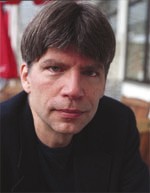 National Book Award-winning writer Richard Powers has been revealed as a ghost writer of books “authored” by Tom Clancy and James Patterson.
National Book Award-winning writer Richard Powers has been revealed as a ghost writer of books “authored” by Tom Clancy and James Patterson.
“I’m not proud of what I did, but we needed a new porch,” said Powers in a rare interview. “Ever wonder why Dave Wallace picked The Hunt for Red October as one of his top ten books? Well, now you have your answer.”
Powers’ ghost writing career started off quietly under Tom Clancy. Word got around. Powers confessed that he had been approached by James Patterson, because Patterson was writing so many books that he had exhausted his rolodex of contacts.
“It was easy money,” said Powers. “I could put these books together over a weekend, because there wasn’t any neuroscience or VR environments involved. Just bad writing. In fact, writing bad sentences was the hardest part of the job.”
 Scholars, sifting through the remainder of philosopher Jean Baudrillard’s papers, have located an essay in which Baudrillard declares:
Scholars, sifting through the remainder of philosopher Jean Baudrillard’s papers, have located an essay in which Baudrillard declares:
The end of comics is, alas, also the end of the dustbins of comics. To this, we must add the Jim Davis comic, Garfield, which is not so much a comic as it is an ideology. Garfield is not an ideology that we can accept. It does not exist in the newspapers. It does not exist in our heads, hearts, and stomachs. We must look into the column inches occupied by Garfield and understand that it is not there.
It is unknown whether Baudrillard applied this criteria to all newspaper comics, but scholars are now sifting through notes Baudrillard had on The Family Circus, Marmaduke and Hagar the Horrible, all dismissed as (loosely translated from the French) “sucky comics.” But the general consensus so far is that Garfield, more than any other comic, spawned a deep animosity within Baudrillard.
[UPDATE: In case it wasn’t clear, this post, as was everything else posted on April 1, 2007, was a false report. I have appended this note because humorless representatives of Mr. Scorsese have contacted me.]
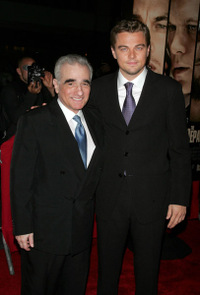 Due to a last-minute scheduling conflict, director Sam Mendes has been replaced by director Martin Scorsese for the upcoming film adaptation of Richard Yates’ Revolutionary Road. Stars Leonardo DiCaprio and Kate Winslet are still attached.
Due to a last-minute scheduling conflict, director Sam Mendes has been replaced by director Martin Scorsese for the upcoming film adaptation of Richard Yates’ Revolutionary Road. Stars Leonardo DiCaprio and Kate Winslet are still attached.
“I’m the only guy who can direct Leo,” said Scorsese, who is now working on a new script with Goodfellas screenwriter Nicholas Pileggi. “We’re going to turn this into an unforgettable movie.”
Scorsese and Pileggi plan big things for this star-studded adaption, including a “re-imagining” of the book’s opening community theater scene, which will now end in a violent bloodbath, leaving the Wheelers the only people standing, as well as 40 minutes of two-lane highway footage interspersed throughout the film. The Rolling Stones’ “Gimme Shelter” will once again be used to enhance pivotal dramatic moments.
After a protracted search, Silvia Garmon, a 23-year-old former grad student, has been discovered to be the only person in the United States to have finished reading Thomas Pynchon’s Against the Day. Garmon, who did not see the sun for almost four months, was able to complete Pynchon’s book through sixteen hour reading days and eventually became so immersed in legitimately finishing the book that she dropped out of grad school to complete the task.
Since completing the book, Garmon has been unable to read another book, having suffered from PTPS (Post-Traumatic Pynchon Syndrome), and is not much of a conversationalist. She has managed to respond to any questions that relate to the Chicago World’s Fair, Tesla coils and higher mathematics.
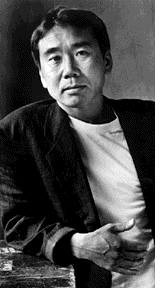 Today, Haruki Murakami’s translator announced that Mr. Murakami would win every single literary award in 2007 and that there was nothing that anybody could do about it.
Today, Haruki Murakami’s translator announced that Mr. Murakami would win every single literary award in 2007 and that there was nothing that anybody could do about it.
“The Kiriyama Prize was just the beginning,” said Alfred Birnbaum, one of his long-time translators, speaking on behalf of Murakami. “We’re going to take the Booker, the Orange Broadband Prize, the National Book Award. It doesn’t matter if Murakami was nominated or eligible or not.”
Asked what personal stake he had in stumping for Murakami or voicing such extraordinary Howard Dean-like excitement, Mr. Birnbaum revealed, “Those bastards Gabriel and Rubin are hogging the work.” So Mr. Birnbuam’s claim is to be taken lightly.
 Disgraced editor and publisher Judith Regan announced this morning, “Contrary to recent reports, rumors of my career death have been greatly exaggerated.”
Disgraced editor and publisher Judith Regan announced this morning, “Contrary to recent reports, rumors of my career death have been greatly exaggerated.”
Regan is back in the saddle with FuQuBooks, a new press founded upon an ancient Sumerian principle that is said to have greatly influenced Cole Porter.
FuQu’s flagship title will be Protocols Misunderstood, an anthology in which several prominent writers will write about their closet anti-Semitism. Regan declined to name names, noting, “You’ll have to buy the book to find out!”
The book will revisit some of the tenets contained within the controversial book, The Protocols of the Elders of Zion, applying them to the O.J. Simpson trial, American Idol, and grilled cheese sandwiches — the latter, allegedly a considerable threat to the master race.
 Dan Brown, author of The Da Vinci Code, has at long last decided to sue himself. In a lawsuit filed with the United States District Court, Mr. Brown named himself as plaintiff and defendant, and efforts were underway to establish Mr. Brown as the Judge trying the proceedings.
Dan Brown, author of The Da Vinci Code, has at long last decided to sue himself. In a lawsuit filed with the United States District Court, Mr. Brown named himself as plaintiff and defendant, and efforts were underway to establish Mr. Brown as the Judge trying the proceedings.
“I’m tired of being sued for plagiarism by third-rate writers,” said Brown. “As a third-rate writer myself, the time had come to conduct my honorable duty.’
Brown hoped that his lawsuit would set a precedent in which the only literary sources for The Da Vinci Code were, in fact, various notes and fiction that Brown had been working on: in other words, a quite conscious theft from Brown to Brown.
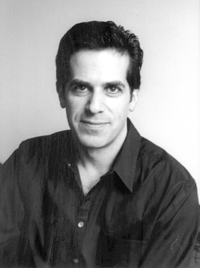 Sensing that two months of Jonathan Lethem touring around the nation was not enough, Doubleday has extended Mr. Lethem’s book tour to five years, hoping that this will increase sales of his latest novel, You Don’t Love Me Yet.
Sensing that two months of Jonathan Lethem touring around the nation was not enough, Doubleday has extended Mr. Lethem’s book tour to five years, hoping that this will increase sales of his latest novel, You Don’t Love Me Yet.
“We got the idea this weekend while watching a Gilligan’s Island marathon on Nick at Nite,” said Doubleday publicist Nadia Meringue. “We figured that if it worked for Bob Denver and Alan Hale, Jr., that it would likewise work for Lethem. We will not rest until their is a Lethem volume in every household’s library.”
Critics raised cautious eyebrows over this eleventh hour publicity move, fearing that Mr. Lethem might be overexposed and unable to write additional novels.
“Novels schmovels,” said Meringue. “We figure that if enough people can get a piece of Lethem in person, they will be compelled to buy any book with the words ‘Jonathan Lethem’ on it.”
To ensure that Lethem-mania goes as planned, Ms. Meringue has fitted Mr. Lethem with a medallion designed to hypnotize all audiences who come into contact with him.
 An advanced copy of the seventh Harry Potter volume, Harry Potter and the Deathly Hallows, unexpectedly made its way into the hands of longtime fan Harriet Schultz, a 14-year-old girl in Milwaukee. Schultz, who finished the book a week ago, has done nothing but cry after learning that Harry Potter is allegedly gay. The moment occurs on Page 530, when Harry reveals that his favorite band is the Scissor Sisters and begins to demand that the Hogwarts begin ironing their shirts.
An advanced copy of the seventh Harry Potter volume, Harry Potter and the Deathly Hallows, unexpectedly made its way into the hands of longtime fan Harriet Schultz, a 14-year-old girl in Milwaukee. Schultz, who finished the book a week ago, has done nothing but cry after learning that Harry Potter is allegedly gay. The moment occurs on Page 530, when Harry reveals that his favorite band is the Scissor Sisters and begins to demand that the Hogwarts begin ironing their shirts.
“How else do you explain that limp-wristed signal to the sky?” said a noted conservative resident who refused to give his name. “Forget witchcraft. J.K. Rowling has had this agenda all along and, as a concerned parent, I think we’re all entitled to a few answers.”
Rowling and Scholastic could neither confirm nor deny that Harry Potter was gay.
“Well, he doesn’t actually say that he’s gay, now does he?” said Harold Bloom, who called our office because nobody had quoted him for an article in a long time and he was in great need of attention. “I still find these books to be trash, but it’s of great comfort to learn that Rowling has become somewhat familiar with William Empson.”
 Literary enthusiasts were shocked to learn that a video of New York Times Book Review editor Sam Tanenhaus and prominent litblogger Edward Champion had been released to YouTube. The two men are seen smiling and laughing, and then hugging each other. The tape cuts out at the 2:14 mark, just as the two men appear to be initiating a French kiss.
Literary enthusiasts were shocked to learn that a video of New York Times Book Review editor Sam Tanenhaus and prominent litblogger Edward Champion had been released to YouTube. The two men are seen smiling and laughing, and then hugging each other. The tape cuts out at the 2:14 mark, just as the two men appear to be initiating a French kiss.
“Again, this demonstrates that the Internet is sub-literary,” said Tanenhaus, who claimed that the man on the tape was an impostor. “I am under no obligation to acknowledge that litblogger’s hugs.”
“What can I say?” said Champion. “Sam and I have a love-hate relationship. You’ve only seen the hate part. Deep down, Sam’s a good guy.”
Prominent litbloggers were prompt in their reactions, accusing Mr. Champion of selling out to get a reviewing gig with the New York Times Book Review.
Deputy editor Dwight Garner, however, had this to say: “Hell will freeze over before that edrants guy is published in these pages. You have my word on that. I don’t know what’s going on with Sam. He seems unwell these days. But that’s his business, not yours.”
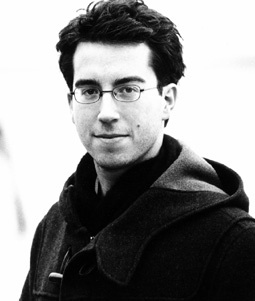 This morning, a visibly frustrated Jonathan Safran Foer cooked himself some sausage and bacon for breakfast, vowing to the world that he would begin eating meat. “They’ve been making fun of me for the past few years for being young and successful,” said Foer, whose growling stomach was clearly not digesting the sudden carnivorous eating habits very well. “I want to show those bastards that I mean serious business.”
This morning, a visibly frustrated Jonathan Safran Foer cooked himself some sausage and bacon for breakfast, vowing to the world that he would begin eating meat. “They’ve been making fun of me for the past few years for being young and successful,” said Foer, whose growling stomach was clearly not digesting the sudden carnivorous eating habits very well. “I want to show those bastards that I mean serious business.”
Foer’s wife, Nicole Krauss, revealed to reporters that she didn’t see this coming.
“I certainly didn’t expect him to turn to pork right before passover,” said Krauss, who was quite adamantly against eating meat. Krauss, however, did confess that Oprah had made the right move bringing baby-in-a-spit narratives to surburban audiences. Staffers from the Wall Street Journal plan to have Krauss take a polygraph test.
When a journalist remained unconvinced of Foer’s meat-eating habits, Foer grabbed an expensive-looking knife, proceeded to slice his wrist open and began supping of his own blood.
“You see! You can call me Jonny “Hard Core” Foer from now on, you little prick!”
The journalist then apologized. He worked for the New York Sun.
I somehow missed it, but Justin TV is a 24-hour vlog, very similar to what Rudy Rucker included in his most recent novel, Mathematicians in Love. Audio and video of one man’s life. It even got written up in the Chron, with fulminating quotes from Andrew Keen. I couldn’t possibly imagine undergoing such 24-7 public exposure. For example, if Justin gets laid or takes a shower, does he still keep the camera on?